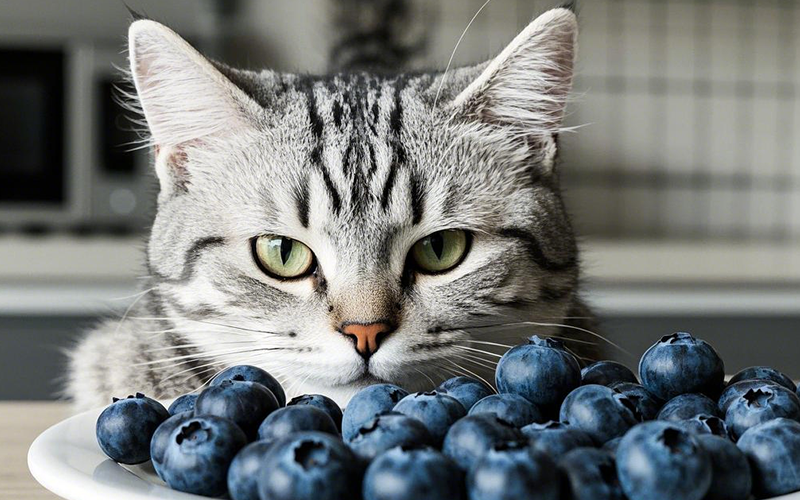Can Cats Eat Blueberries? A Guide to Healthy Snacking for Your Cat
- 11 Mar 2025 13:44
If you've ever been snacking on some blueberries and thought, "Can I share these with my cat?" the good news is that yes, cats can eat blueberries! These tiny, nutrient-packed fruits are not only safe for your cat but can also provide some health benefits when offered in moderation. However, like all treats, it's important to be aware of how and when to give blueberries to your feline friend.

Are Blueberries Safe for Cats? 🍇
Yes, blueberries are safe for cats when given in small amounts. These fruits are not toxic and are considered one of the healthier fruits you can offer your cat. Blueberries are low in calories, high in antioxidants, and contain a range of vitamins that can contribute to your cat’s well-being.
Health Benefits of Blueberries for Cats 🐱
Here are some of the benefits your cat might enjoy when consuming blueberries:
1. Rich in Antioxidants 💪
Blueberries are loaded with antioxidants, particularly flavonoids, which help neutralize free radicals and protect cells from oxidative stress. While cats have a strong immune system, antioxidants can still support overall health, especially in aging cats.
2. High in Vitamin C 🍊
Although cats can produce their own vitamin C, small amounts of this vitamin can still be beneficial. Vitamin C helps support a healthy immune system, so offering blueberries occasionally may help your cat's natural defenses.
3. Low in Calories 🔥
Blueberries are low in calories, making them a great snack for cats who need to maintain a healthy weight. If your cat enjoys a small treat, blueberries are a healthier option compared to high-calorie or high-fat snacks.
4. Source of Fiber 🌾
Blueberries also contain a moderate amount of fiber, which can support digestion. In small amounts, fiber may help keep your cat's digestive system regular and can be beneficial for cats prone to constipation.
Potential Risks of Feeding Blueberries to Cats ⚠️
While blueberries are generally safe, there are a few things to keep in mind:
1. Digestive Upset 🤢
Cats are obligate carnivores, meaning their digestive systems are designed to process animal protein, not fruits. If you feed your cat too many blueberries, it may cause mild stomach upset, such as diarrhea or vomiting. Always start with a small amount to see how your cat reacts.
2. Choking Hazard ⚠️
Although blueberries are small, any treat can pose a choking hazard, especially if your cat tries to swallow it without chewing. Make sure to offer the berries whole but observe your cat while eating to ensure they don’t have trouble swallowing.
3. Overfeeding 🐱
As with any treat, moderation is key. Blueberries should only be an occasional treat and not a regular part of your cat's diet. Overfeeding fruits like blueberries can lead to an imbalance in their diet and contribute to obesity.
How to Safely Feed Blueberries to Your Cat 🍇
If you'd like to offer your cat a taste of blueberries, here’s how to do it safely:
Start with a small amount: Offer a single blueberry to see how your cat reacts. If your cat enjoys it and doesn’t experience any digestive issues, you can occasionally add a few more as a treat.
Wash thoroughly: Ensure that the blueberries are clean and free of any pesticides or chemicals. Opt for organic if possible.
Offer them fresh or frozen: Some cats enjoy frozen blueberries, which can make for a cool, refreshing treat during hot weather. Just be sure to only give a few at a time.
What Other Fruits Can Cats Eat? 🍓
If your cat enjoys blueberries, you may want to try offering other cat-safe fruits in moderation. Here are some fruits that are generally safe for cats:
Strawberries: Cats can eat strawberries, but remove the stems and leaves.
Watermelon: A hydrating and safe fruit, but avoid the seeds and rind.
Cantaloupe: Many cats enjoy melon, but like watermelon, remove any seeds and rind.
Bananas: A safe treat in small amounts, but keep in mind the sugar content.
Avoid feeding your cat fruits like grapes, raisins, citrus fruits (oranges, lemons), and avocado, as they can be toxic to cats.
Conclusion 🎉
In conclusion, blueberries are a safe and healthy treat for cats when offered in moderation. These small berries are packed with antioxidants, vitamins, and fiber, making them a good occasional snack for your feline friend. However, always be cautious about portion sizes to avoid digestive issues and ensure that blueberries are just one of many treats in your cat’s diet.
If you’re ever unsure about what foods are safe for your cat, or if you have questions about your pet's health, consider reaching out to PettureX, an AI-powered pet health assistant. PettureX offers 24/7 consultations and can provide expert guidance on safe feeding practices and much more! 🐾
Related

The Burning Question: Can Cats Eat Jalapenos? A Comprehensive Safety Guide
- 21 Apr 2025
Cool Temptation: Can Cats Eat Ice Cream Safely? The Vet-Backed Truth
- 21 Apr 2025
Frankly Dangerous: Can Cats Eat Hot Dogs? Vet Explains the Serious Risks
- 16 Apr 2025
A Purrfect Protein? Can Cats Eat Ground Turkey Safely? (Vet-Reviewed Guide)
- 16 Apr 2025
Gritty Situation: Can Cats Eat Grits Safely? Vet Explains the Risks
- 16 Apr 2025
Crunchy Query: Can Cats Eat Green Peppers? A Vet-Reviewed Safety Analysis
- 16 Apr 2025
Gravy Danger Zone: Can Cats Eat Gravy Safely? (Vet-Reviewed Warning)
- 16 Apr 2025
Toxic Temptation: Can Cats Eat Grapefruit? Vet Explains the Dangers
- 16 Apr 2025
Emergency Meal or Major Mistake? Can Cats Eat Dog Food For A Couple Days? (Vet Guide)
- 16 Apr 2025
Dandelions & Felines: Can Cats Eat These Common Weeds Safely? Vet Explains
- 16 Apr 2025
